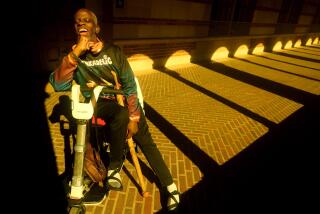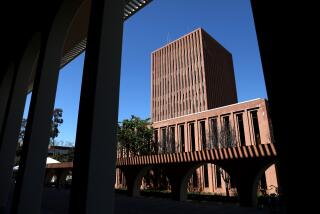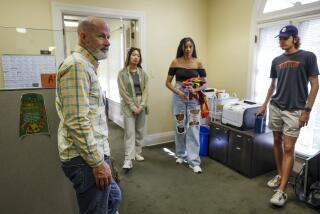USC program lets disabled student complete degree from far away
The accident that left Ryan Williams paralyzed from the neck down could have ended his promising career as a robotics researcher.
Recovering at his parents’ home in southwest Virginia, with limited mobility, there was no way he could return to USC full time to complete his engineering graduate studies.
But from his study nearly 2,500 miles away, Williams was able to complete his course work and participate in classes as if he were right there on the USC campus. Now the 31-year-old roboticist, already internationally recognized for his research into undersea robots, is on the cusp of receiving his doctorate this spring.
FOR THE RECORD:
USC Roboticist: A Jan. 3 article in the Business section about the Distance Education Network at USC’s Viterbi School of Engineering misspelled the last name of its executive director. It is Binh Tran, not Tranh. —
“There’s no excuse not to be able to do this,” Williams said. “It’s made no difference being at home with all the communication tools I have. I don’t really feel that disconnected.”
Williams is a student of USC Viterbi School of Engineering’s cutting-edge Distance Education Network, a high-tech classroom and laboratory unbound by geography.
Distance learning has been reshaping higher education for more than a decade as colleges and universities have experimented with ways to expand their reach and potential audience via the Internet. USC’s Viterbi has been at the forefront of that transformation, thanks to its investment in the system known officially as DEN@Viterbi.
Since 2000, more than 3,000 engineering degrees have been awarded to students attending through DEN@Viterbi. Over that time, the network has evolved from primarily broadcasting lectures to allowing for an immersive and interactive experience that lets a remote student participate fully in classroom discussions and other types of work.
To achieve that experience, Binh Tranh, executive director of DEN, said the focus of the system is not to maximize the number of participants, but rather to simulate as closely as possible the human interactions that would take place if the person was sitting in the classroom.
“There can’t be a reason the technology is inhibiting any of the interactions,” Tranh said. “The focus is on making it really engaging and interactive. It should be just like that person is right there in the room with everyone else.”
Inside Viterbi classrooms, an array of high-definition video cameras streams the classroom from multiple angles. A series of monitors on the professor’s desk and around the classroom show the faces of the remote students, allowing the conversation to flow between students both present and virtual.
DEN has become a vehicle to enable primarily corporate students to earn a master’s degree from the prestigious Viterbi school. But for Williams, it proved to be lifeline back to his academic dreams.
After a promising stretch as an undergraduate at Virginia Polytechnic Institute, Williams arrived at USC in fall 2006. He would get a chance to work with one of world’s most prestigious undersea robotics programs in the world.
But in January 2008, Williams broke his neck while diving into the water at Santa Monica Beach. The accident would eventually leave him paralyzed from the neck down, except for some limited ability to move an arm.
Even as physical rehab was beginning, Williams started discussing the logistics of continuing his studies with colleagues at Viterbi. His brother, Keith, said he was not surprised by Ryan’s resilience. He said Ryan always remained remarkably positive in the face of any setbacks while growing up.
Keith helped convert their parents’ garage into a work space for his brother. From there, Williams could log onto DEN@Viterbi and access classroom sessions using just a standard Web browser and a webcam.
Easily exhausted, Williams could only take one class each year until he finally completed his course work. Meanwhile, he also made strides in his research, which focuses on how groups of undersea robotics interact with one another. He runs computer simulations at home and talks over Skype with a team of Italian researchers who test his theories in the field.
His advisor at Viterbi, Gaurav Sukhatme, chair of the department of computer science and a world-renowned roboticist, said Williams’ effect on the field has already been remarkable and his reputation among his peers is growing.
“He’s able, even in the greatest moments of challenge, to grab the opportunities that are available,” Sukhatme said. “He’s intellectually gifted, but so are most students here. What’s exemplary about Ryan is his ability to focus on his work and run with it.”
Williams has had four papers accepted into conferences, and this year has traveled to Germany and Japan to deliver talks on his work. After he receives his doctorate, Williams hopes to one day have his own lab. It’s the same dream he had before the accident, but one still possible because of DEN@Viterbi.
“What matters most to me right now is that that I’m having an impact and I’m grabbing the opportunities that come my way,” he said. “It’s been a long process to get here and I’ve enjoyed it. Now I’m ready to move on to the next phase.”
Twitter: @obrien







